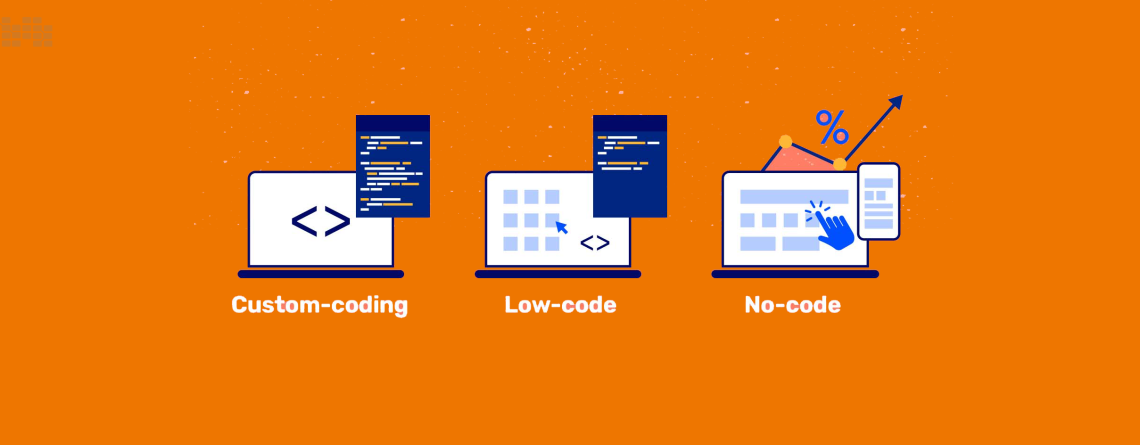Low Code vs No Code vs Custom Code
The growing demand for IT innovations has revealed a major talent shortage in the solutions development sector. As more IT projects are put to the “pending” folder, the time-to-market delivery of thousands of different solutions increases, affecting overall business performance and market development.
To address this issue, developers from various IT sectors are constantly implementing a diverse set of software development solutions, methodologies, and approaches. Agile development, rapid prototyping, SMART goals, and the lean approach are just a few methods for speeding up the development process.
We’ll compare low code, no code, and custom development techniques in this post. To comprehend the worth of each, we’ll delve deeper into their key differences, benefits, and potential pitfalls of low code/no code/custom code application development.
As a result, by the end of this article, business owners will have determined the most efficient model for their projects and will be able to make an informed decision on which development approach will yield the greatest profits for their businesses.
Custom Software Development: Definition & Key Features
Custom software development is the process of creating solutions from the ground up by utilizing a third-party software development vendor or in-house software engineers. Custom development is typically used when a company has to meet the needs of end-users with special features that cannot be found in pre-existing solutions.
A custom development process includes gathering requirements, creating a development plan, MVP modelling and analysis, UI/UX design, writing final custom code, testing, and maintenance. Companies can only ensure maximum fulfilment of their business needs with this approach to software development.
Benefits of Custom Development over No Code and Low Code Solutions
Based on the benefits listed above, it is clear that a custom approach has the potential to greatly simplify the development process, optimize coding, and improve delivery time.
The following are the most important reasons why businesses choose custom software development:
Unlimited Functionality
Traditional custom development provides complete freedom in software programming because its design does not impose any constraints on the app development process. So, if you need to launch a feature-specific product for your company, you should probably write custom code to bring all of your ideas to life.
Increased Flexibility
You can benefit from maximum freedom with bespoke development because you have complete access to the source code. As a result, you can easily modify existing functionality or add new features to the solution to meet the ever-changing needs of your business. Such adaptability is a huge advantage in the long run because it allows you to remain competitive in the market.
Maximum Security
Custom development solutions give you complete control over the source code, allowing you to implement any modern security measures you desire. The security of low and no code solutions is primarily dependent on the service provider. As a result, if you require an application that will process a large amount of sensitive business and customer information, a custom approach is preferable. However, make certain that you work with professional developers who understand how to maximize all of the advantages of custom development.
Rights
Because you have exclusive access to the source code with bespoke development, your solution is yours to keep and can be used for business purposes. Downloading the source code is impossible in the situation of no code and minimal code development, restricting the solution’s use cases.
High Quality
Custom software is usually of higher quality because it is created by engineers with years of experience who use cutting-edge technologies to perfectly meet your specific business needs. In the case of no code or low code development, you simply try to apply an existing solution to your problem; however, due to a lack of customization, such a solution will not be exactly what you need.
Scalability
As your company grows, you may need to improve the performance, security, and functionality of your software. Because you built the solution from the ground up, you can easily scale it up to handle and process larger amounts of data.
Performance
You will be able to modify the performance characteristics of custom software while constructing it from start. In the case of low code and no code solutions, performance is totally dependent on the low code platform provider’s default specs and cannot be altered. As a result, if you require a high-performance application capable of handling massive amounts of data and with large scaling potential, you should consider custom development from top-tier engineers.
Now that we’ve covered all of the advantages of the custom approach, let’s look at the low code/no code approach to software development.
Low Code and No Code: Definition & Key Features
Though both approaches are related to the scope of software development and share some characteristics, they are not the same thing. Let’s take a look at the specifics of app development using no code and low code methods and see how they differ from the well-known custom development.
What is Low Code Application Development?
Low code is a code generating method that uses drag-and-drop visual blocks with pull-down menu interfaces. This architecture enables the rapid development of prototypes for solutions to common problems such as CRUD operations, filtering, and operational flow creation.
Low code application development is a bridge between traditional development, which is popular among skilled coders, and no code application development, which is aimed for citizen developers and IT newbies. Unlike previous models, it is more adaptable and offers more customization possibilities without compromising delivery speed or pricing. As a result, it can greatly simplify the development of complex and feature-rich software solutions.
Web and mobile app development, cross-platform solutions, robotic automation technologies, appraisal management software, and many other examples are notable examples of low code development.
What is a No Code Development?
Another rapid development option is no code development, which uses a modular plug-and-play design to build applications of various sizes. This strategy, like minimal code, provides considerable time and cost savings, making it a good programming option for junior to senior-level workers.
At the same time, no code app development has fewer customization options, which, when compared to a low code alternative, is offset by its user-friendly and accessible coding qualities.
Self-service solutions for businesses, dashboards, mobile applications, web platforms, and many other applications are commonly developed using the no code method.
Benefits of Low Code, No Code Solutions Over Custom Software
Let’s look at the benefits of a programming model now that we’ve covered the fundamentals of little code, no code, and their commercial potential. The following are some of the most noteworthy advantages of no code vs little code in app development.
Better Accessibility
Low code and no code solutions are intended to be utilized by those with little or no technical knowledge. This feature, which is one of the most prominent benefits, reduces the complexity of app development while maintaining its scalability.
As a result, it is frequently used for software solutions with fewer specifications and features that are also low-cost: MVPs or other software with basic functionality.
Accelerated Time-To-Market & Development Speed
Regardless of the business, app development speed has always been a critical factor in any software project. To stay ahead of their competitors, business owners usually strive to construct an app in the lowest amount of time possible. The tried-and-true method for accomplishing this goal in software development is to launch a cross-platform minimum viable product (MVP).
Unlike traditional app development, low code and no code protocols offer cross-platform programming, allowing for the rapid construction of a functional, sustainable cross-platform MVP solution. According to 451 Research, these coding methods can help firms save app development time by 90%.
Cost-Efficiency
Businesses can also save money on app development projects by using a low code/no code approach. This is primarily due to the following no-code and low-code features:
- applying the rapid application development (RAD) concept, which reduces the delivery time;
- hiring citizen developers instead of high-paid senior specialists, which cuts down the labor costs;
- utilizing fewer ready-made programming platforms and tools, which optimizes cost allocation.
Thus, enterprises can quickly bring their ideas to life without sacrificing the product’s quality or delivery time.
Facilitated Deployment & Maintenance
When compared to traditional software programming, low code app development allows teams to handle possible problems, code errors, and related performance issues during the deployment stage more effectively.
As a result, organizations can always roll back modifications to the prior version with a single click, eliminating any problems before they become a nuisance.
Reduced Risks & Higher ROIs
Low code and no code solutions have become popular for supporting industry standards and security best practices, owing to their ease of development and long-term viability.
Enterprises can now focus on their business objectives and workflow optimization without jeopardizing the security or smooth operation of the application.
Low Code/No Code vs Custom Development
After investigating the potential of low and no code development, the most frequently asked question is whether these solutions can displace the traditional development model from the race.
After years of coding experience, we are confident that low code/no code approaches will not be able to compete with custom development for a variety of reasons. Let us contrast two approaches in the following areas:
- Flexibility. With manual coding, developers can build nearly any feature that completely fits the client’s expectations and needs. Additionally, creators are not limited in choosing the tech stack, hostings, frameworks, APIs, and other tools, which also results in a higher-quality outcome.
- Customization. When delivering the software with a traditional model, it’s possible to consider and customize all the aspects of your application with no restrictions due to the development specifics. This is the opposite of low and no code development, where it’s required to implement the features based on the limitations of the coding process under each model.
- Expertise. Custom software development will be also a better fit for projects that require deeper expertise in UI/UX design, advanced security, or complex functionality, which is a must for launching a unique, groundbreaking application.
- Control. Unlike low code and no code, custom coding leaves more opportunities for managing the process across all the stages of system development. Therefore, clients can present the product as a proprietary tool with a unique and sustainable system.
- Revolutionary product development. Suppose the key goal of the product is to deliver an innovative software solution with specific functionality that is not currently present in the software market. In that case, custom software development will be a winning option. It can greatly benefit in launching outstanding features which are built according to the slightest details of your tech requirements.
As you can see, not all projects will fit the low code and no code development models; some will require advanced coding specifics, deeper expertise, or greater versatility, which the traditional custom coding approach completely covers.
As a result, Nile Bits experts believe that, while the no code/low code approach may work for small solutions, only custom development can enable the creation of a high-performing, secure, and functional solution.
Which One to Choose: Low Code vs No Code vs Custom Development?
We can plainly identify the advantages of the traditional development strategy based on a careful study of each programming style. However, when it comes to deciding which option is the most efficient (low code vs. no code vs. custom development), business owners are frequently unsure.
Let’s now summaries the best use cases for each solution in order to make the best decision.
Choose the no code development platforms in the following cases:
- If your project is limited in time, features a tight budget, and has only a few programmers on board;
- If the application has simple modifications and a limited need for data transfer and third-party integration;
- If a significant part of the project’s delivery time is dedicated to the phases like design and planning;
- If you need to minimize the possibility of performance issues and code bugs;
- If the citizen programmers don’t possess enough experience in complex app development.
Instead, utilizing a low code development platform will be a better option:
- If you need slightly more versatility and customization for the app functionality
- If the project requires rapid development with a focus on regulatory compliance (GDPR, ISO, HIPAA, etc.)
- If it’s required to integrate the IoT solutions
- If your in-house team possesses basic expertise and specific skills in coding that will be applied in the project development
Custom software development, on the other hand, is more versatile and applicable to nearly any project, regardless of its complexity or coding specifics.
We recommend applying the custom development method in the following cases:
- If you need advanced security and have engineers who can leverage the benefits of most modern security techniques;
- If you need to develop specific functionality that cannot be delivered with low code and no code solutions;
- If you’re handling a complex project;
- If you’re dealing with regulated industries with a diverse number of compliance specifications.
As a result, both low code and no code systems are widely valued for their ease of use, speed, and agility. While no code and low code are primarily aimed at applications with simple functionality, traditional coding allows far more flexibility in the app development process.
Realizing this, business owners can now define the best option for software development that will bring the most value to their company.
Leverage Nile Bits Customer Development Expertise to Create Innovative Solutions
Low and no code development platforms have ushered in a revolution in the world of software development, making it more accessible, quick, and productive for enterprises of all sizes. They cannot, however, adequately demonstrate custom software development in the long run due to limited capability and more basic development specifications.
As you can see, only custom development allows you to create complex, industry-specific projects with advanced functionality and a one-of-a-kind user experience. However, in order for your venture to be successful, you must hire a reputable software development vendor. Already looking for the best custom development team for your next project? We’ve got your back!
Nile Bits engineers have extensive experience in app programming and are constantly on the lookout for new breakthroughs and trends in custom software development in order to create the most efficient products across numerous industries. So far, our company has helped hundreds of businesses thrive in developing and integrating custom IT solutions of varying complexity and industry specialization.
If you are considering developing a custom software project and require expert assistance, please contact us right away! Our experts are always ready to design the most efficient, long-term IT solution for your company that will benefit it for years to come.













Leave a Reply